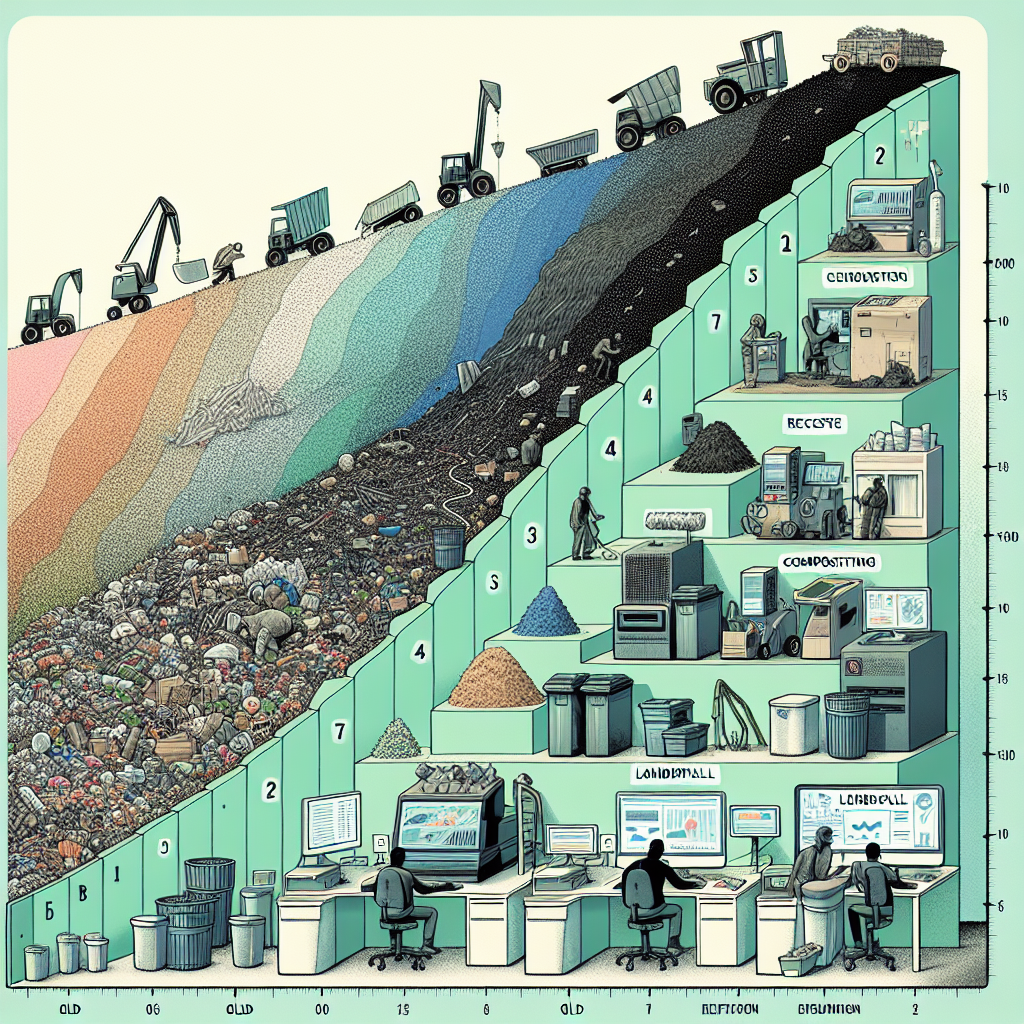-
Table of Contents
“Revolutionizing Waste: Smart Solutions for a Cleaner Tomorrow”
Introduction

Technology is revolutionizing waste management by introducing innovative solutions that enhance efficiency, reduce environmental impact, and promote sustainability. Advanced technologies such as smart sensors, data analytics, and automation are enabling more effective waste collection, sorting, and recycling processes. Smart bins equipped with sensors can monitor waste levels in real-time, optimizing collection routes and reducing fuel consumption. Data analytics provide insights into waste generation patterns, helping municipalities and companies to implement targeted waste reduction strategies. Additionally, automation and robotics are improving the accuracy and speed of sorting recyclable materials, minimizing contamination and increasing recycling rates. These technological advancements are not only making waste management more efficient but also contributing to the creation of a circular economy, where waste is minimized, and resources are reused and recycled to their fullest potential.
Smart Waste Bins: Revolutionizing Waste Collection
In recent years, the integration of technology into waste management has brought about significant advancements, particularly with the advent of smart waste bins. These innovative devices are revolutionizing waste collection, making it more efficient, environmentally friendly, and cost-effective. As cities around the world grapple with increasing waste production, smart waste bins offer a promising solution to an age-old problem.
At the heart of smart waste bins is the use of sensors and connectivity. These bins are equipped with sensors that monitor the fill level in real-time, providing valuable data to waste management companies. This data is then transmitted to a central system, allowing for optimized collection routes and schedules. Consequently, waste collection trucks no longer need to follow fixed routes, which often result in half-empty bins being emptied unnecessarily. Instead, they can focus on bins that are actually full, reducing fuel consumption and lowering carbon emissions.
Moreover, smart waste bins contribute to a cleaner urban environment. Overflowing bins are a common sight in many cities, leading to littering and attracting pests. By alerting waste management teams when they are nearing capacity, smart bins help prevent such issues. This proactive approach ensures that waste is collected before it becomes a problem, enhancing the overall cleanliness and hygiene of public spaces.
In addition to improving efficiency and cleanliness, smart waste bins also play a crucial role in promoting recycling. Many of these bins are designed with multiple compartments for different types of waste, such as recyclables, organic waste, and general trash. The sensors can detect the type of waste being disposed of and provide feedback to users, encouraging proper sorting. This not only increases recycling rates but also reduces contamination, making the recycling process more effective.
Furthermore, the data collected by smart waste bins can be analyzed to gain insights into waste generation patterns. This information is invaluable for city planners and policymakers, who can use it to develop targeted waste reduction strategies. For instance, if data shows that a particular area generates a high volume of plastic waste, initiatives can be launched to promote the use of reusable materials in that community. Such data-driven approaches enable more informed decision-making and foster a culture of sustainability.
The benefits of smart waste bins extend beyond urban areas. In rural and remote regions, where waste collection services are often limited, these bins can provide a much-needed solution. By optimizing collection routes and schedules, smart bins ensure that even the most isolated communities receive regular waste collection services. This not only improves living conditions but also helps protect the natural environment from illegal dumping and pollution.
Despite the numerous advantages, the implementation of smart waste bins is not without challenges. The initial cost of these high-tech bins and the necessary infrastructure can be a barrier for some municipalities. However, the long-term savings in operational costs and environmental benefits often outweigh the initial investment. Additionally, as technology continues to advance and become more affordable, it is likely that the adoption of smart waste bins will become more widespread.
In conclusion, smart waste bins are transforming the way we manage waste, offering a more efficient, sustainable, and cost-effective solution. By leveraging technology, these bins address many of the challenges associated with traditional waste collection methods. As cities and communities around the world continue to embrace this innovation, we can look forward to a cleaner, greener future.
AI-Powered Recycling: Enhancing Efficiency and Accuracy
In recent years, the integration of artificial intelligence (AI) into waste management systems has revolutionized the way we handle recycling, significantly enhancing both efficiency and accuracy. As the world grapples with mounting waste and environmental concerns, AI-powered recycling solutions are emerging as a beacon of hope, offering innovative ways to tackle these pressing issues.
One of the most notable advancements in this field is the development of AI-driven sorting robots. These robots are equipped with advanced sensors and machine learning algorithms that enable them to identify and sort various types of recyclable materials with remarkable precision. Unlike traditional methods, which often rely on manual labor and can be prone to human error, AI-powered robots can process large volumes of waste quickly and accurately. This not only reduces the likelihood of contamination in recycling streams but also ensures that valuable materials are recovered and reused, rather than ending up in landfills.
Moreover, AI technology is being utilized to optimize waste collection routes. By analyzing data on waste generation patterns and bin fill levels, AI systems can predict the most efficient routes for collection trucks. This not only minimizes fuel consumption and reduces greenhouse gas emissions but also ensures that bins are emptied before they overflow, thereby maintaining cleaner and more hygienic urban environments. The use of AI in route optimization exemplifies how technology can contribute to more sustainable and cost-effective waste management practices.
In addition to improving sorting and collection processes, AI is also playing a crucial role in educating and engaging the public about recycling. Smart bins, for instance, are being deployed in various cities around the world. These bins are equipped with AI-powered cameras and sensors that can identify the type of waste being disposed of and provide real-time feedback to users. By offering instant guidance on proper recycling practices, smart bins help to reduce contamination and increase recycling rates. Furthermore, the data collected by these bins can be analyzed to gain insights into public behavior and inform future waste management strategies.
Another exciting development is the use of AI in waste-to-energy technologies. AI algorithms can optimize the operation of waste-to-energy plants by predicting the calorific value of incoming waste and adjusting the combustion process accordingly. This ensures that the maximum amount of energy is extracted from the waste, thereby improving the overall efficiency of the plant. Additionally, AI can help to monitor and control emissions, ensuring that waste-to-energy processes comply with environmental regulations and minimize their impact on air quality.
While the benefits of AI-powered recycling are clear, it is important to acknowledge the challenges that come with implementing these technologies. High initial costs, the need for specialized skills, and concerns about data privacy are some of the hurdles that need to be addressed. However, as technology continues to advance and become more accessible, it is likely that these challenges will be overcome, paving the way for wider adoption of AI in waste management.
In conclusion, AI-powered recycling represents a significant leap forward in our efforts to manage waste more effectively and sustainably. By enhancing the efficiency and accuracy of sorting, optimizing collection routes, educating the public, and improving waste-to-energy processes, AI is helping to create a cleaner and greener future. As we continue to innovate and embrace these technologies, we can look forward to a world where waste is not just a problem to be managed, but a resource to be harnessed.
IoT Solutions: Optimizing Waste Management Systems
In recent years, the integration of Internet of Things (IoT) technology into waste management systems has revolutionized the way cities and municipalities handle waste. This innovative approach not only enhances efficiency but also promotes sustainability, making it a win-win for both urban environments and the planet. By embedding sensors and connectivity into waste bins and collection vehicles, IoT solutions provide real-time data that can be used to optimize routes, reduce costs, and improve overall service quality.
One of the most significant advantages of IoT in waste management is the ability to monitor waste levels in real-time. Traditional waste collection methods often rely on fixed schedules, which can lead to inefficiencies such as empty bins being collected or overflowing bins being neglected. With IoT-enabled sensors, waste management companies can receive instant notifications when a bin is nearing its capacity. This allows for dynamic scheduling, where collection routes are adjusted based on actual need rather than predetermined schedules. Consequently, this reduces the number of unnecessary trips, saving fuel and reducing carbon emissions.
Moreover, IoT technology facilitates predictive maintenance of waste collection vehicles. Sensors installed in these vehicles can monitor various parameters such as engine health, tire pressure, and fuel levels. By analyzing this data, maintenance can be scheduled proactively, preventing breakdowns and extending the lifespan of the vehicles. This not only ensures that the fleet operates at peak efficiency but also minimizes downtime, which can be costly for waste management companies.
In addition to optimizing collection routes and vehicle maintenance, IoT solutions also enhance the sorting and recycling processes. Smart bins equipped with sensors can identify the type of waste being disposed of, enabling more accurate sorting at the source. This reduces contamination in recycling streams, making the recycling process more efficient and cost-effective. Furthermore, data collected from these smart bins can provide valuable insights into waste generation patterns, helping municipalities to design better waste reduction and recycling programs.
Another compelling benefit of IoT in waste management is its potential to engage and educate the public. Many smart waste management systems come with user-friendly apps that allow residents to track their waste disposal habits and receive tips on how to reduce waste. These apps can also send notifications about collection schedules and recycling guidelines, fostering a more informed and responsible community. By involving citizens in the waste management process, municipalities can achieve higher levels of participation and compliance, ultimately leading to a cleaner and more sustainable environment.
While the benefits of IoT in waste management are clear, it is important to acknowledge the challenges that come with implementing such advanced systems. Initial setup costs can be high, and there may be resistance to change from both employees and the public. However, the long-term savings and environmental benefits often outweigh these initial hurdles. Additionally, as technology continues to advance, the cost of IoT devices is expected to decrease, making these solutions more accessible to a wider range of municipalities.
In conclusion, IoT technology is playing a pivotal role in transforming waste management systems. By providing real-time data and enabling dynamic decision-making, IoT solutions optimize collection routes, enhance vehicle maintenance, improve sorting and recycling processes, and engage the public in waste reduction efforts. As cities continue to grow and the demand for efficient waste management increases, the adoption of IoT technology will undoubtedly become more widespread, paving the way for smarter, more sustainable urban environments.
Conclusion
Technology is significantly enhancing waste management by introducing advanced methods for waste collection, sorting, and recycling. Innovations such as smart bins equipped with sensors, automated sorting systems, and AI-driven analytics are optimizing the efficiency and accuracy of waste processing. Additionally, advancements in waste-to-energy technologies are converting waste into renewable energy sources, reducing landfill use and environmental impact. Overall, technology is making waste management more sustainable, cost-effective, and environmentally friendly.





